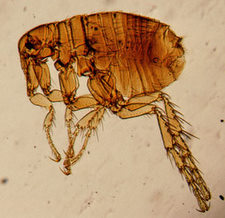 Intense scratching can eventually lead to partial or full hair loss.
Intense scratching can eventually lead to partial or full hair loss.
There can be many causes for itching and scratching. These include external parasites such as fleas, Cheyletiella, scabies, Demodex, lice or poultry mites and fungal/yeast growth on the skin.
Common Causes of Dog Skin Conditions
The skin is the body’s largest organ and is very responsive to the overall health of the body. And the overall health of the body can be affected from both inside and outside her body. This can make it very difficult to determine the exact cause of the problem.
What's more, some factors could be occuring without your knowledge.
Poor Quality Dog Food
 The number one cause of skin conditions in dogs is poor-quality food.
The number one cause of skin conditions in dogs is poor-quality food.
Unfortunately, many dog owners believe that they are feeding their dogs a high-quality diet when their dog food is actually harming their dog.
Parasites that Cause Dog Skin Conditions
Skin parasites tend to be the most attracted to dogs that have a poor overall health. These can be aging dogs, dogs with an inadequate diet or dogs living in an unhealthy environment.
Dog skin parasites range from mild to severe and each type can cause a different reaction in your dog.

Here is a list of the common dog skin parasites along with the symptoms of each (click the links below for more information):
Dog fleas - Many dog owners have dealt with fleas at one time or another, and with adequate treatment they can be history in no time!
Symptoms of fleas: Persistent biting, nibbling and/or scratching different areas of the fur or skin.
Dog ticks - Ticks are not permanent residents on the skin of your dog. They attach themselves to the skin, suck some blood, and then fall off to lay eggs. While they do not usually present a big problem, they can carry a couple of scary diseases and should be prevented just in case.
Symptoms of ticks: Dogs will often show no symptoms, but you can easily spot ticks attached to the skin - another good reason for frequent dog grooming.
Dog lice - Lice are less common on dogs than ticks and fleas, but there are still many reported cases. They are tiny white varmints that may be difficult to find... you will need to look for the eggs attached the hair follicle of the dog. These too are easily treated.
Symptoms of lice: As with fleas, persistent biting, nibbling and/or scratching different areas of the fur or skin. Lice are much less common than fleas, so look closely to confirm which one you are dealing with (see our Dog Flea Medicine and Dog Lice pages to learn what they look like).
Dog mange - Dog mange can be very serious and can cause your dog much distress and physical discomfort. The most common form of mange is caused by a tiny mite that lives in the hair follicles of the infested dog. There are a few other forms of mange which are discussed in detail on our How to Treat Dog Mange page.
Symptoms of mange:
- Itching and a dusting of “dandruff” around the head, neck and back
- Thinning of the hair around the eyes, mouth and front of the legs, evolving into patches approximately one inch in diameter
- Skin patches may become sore, crusted and oozing
- Digging and biting fur or skin in a ferocious manner (similar to flea infestation or severe skin rash or disease). This may in turn irritate the skin and cause oozing sores, crusty ear tips, intense itching and loss of hair, mainly on the ears, elbows, legs and face
Ringworm - Ringworm is a fungus (not a worm) and can be a serious problem. It can also be spread to humans. If your dog has widespread ringworm, it is probably an indication of overall poor health.
Symptoms of ringworm:
- Often starts as a red area, then it develops into a small ring that slowly grows
- Area surrounding ringworm will often be hairless or stubbly
- Thickened skin
- Scabbed and/or irritated skin
Preventive Dietary Supplement
As a preventive measure, if your dog is prone to skin problems we recommend supplementing their diet with the herbal Skin & Coat Tonic from Native Remedies.
It contains several herbs that have been proven to improve the health of the skin and coat, along with other positive effects such as boosting the immune system, liver, kidney and thyroid functioning:
- Horsetail - known for its high silica content, which is the main component in all connective body tissues. Positively effects all body tissue along with urinary tract health.
- Dandelion - benefits the liver and digestive system and helps to maintain normal blood pressure.
- Spirulina - contains protein, vitamins and carotenoids and supports energy, the immune system and liver functioning.
- Fucus vesiculosis - concentrated source of minerals, and aids in the production of thyroid hormones which helps to maintain healthy metabolism in all body cells. One of its major effects is to improve overall skin and coat health.
- Kalium sulphate - a salt that is essential for distributing life giving oxygen throughout the body and keeping cell membranes in peak health.






